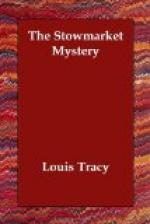In these trivial matters he owned to a boyish enthusiasm. It stimulated him to “beat the other man,” even if he only called upon the London, Brighton, and South Coast line to conquer a weak opponent like the South-Eastern.
At his flat were several letters and telegrams. Mrs. Capella wrote:
“I have seriously considered your last words to me. It is hard for a woman, the victim of circumstances, and deprived of her husband’s support at a most trying and critical period, to know how to act for the best. You said you wished your hands to be left unfettered. Well, be it so. You will encounter no hindrance from me. I pray for your success, and can only hope that in bringing happiness to others you will secure peace for me.”
“Poor woman!” he murmured. “She still trusts to chance to save her. Whom does she dread? Not her husband. Each day that passes she must despise him the more. Does she know that Robert loves her? Is she afraid that he will despise her? Really, a collision in which Capella was the only victim would be a perfect godsend.”
David telegraphed the safe arrival of the party at a Whitby hotel. “We have seen nothing more of our Northumberland Avenue acquaintance,” he added.
Holden, too, cabled from Paris, announcing progress. The remainder of the correspondence referred to other matters and social engagements, all which latter fixtures the barrister had summarily broken.
Winter was announced. His face heralded important tidings.
“Well, how goes the ratiocinative process?’ was Brett’s greeting.
“I don’t know him,” said the detective. “But I do happen to know most of the private inquiry agents in London, and one of ’em is going strong in Middle Street. He’s watching Mr. Ooma for all he’s worth.”
“Mr. Whom-a?”
“I’m not joking, Mr. Brett. That is the name of the mysterious gent in No. 37—Ooma, no initials. Anyhow, that is the name he gives to the landlady, and her daughter—the girl you followed from the hotel—tells all her friends that when he gets his rights he will marry her and make her a princess.”
“Ooma—a princess,” repeated Brett.
“Such is the yarn in Kennington circles. I obeyed orders absolutely. I and my mate took turn about in the lodgings we hired, where we are supposed to be inventors. My pal has a mechanical twist. He puts together a small electric machine during his spell, and I take it to pieces in mine. Yesterday my landlady was in the room, and Ooma looked out of the opposite window. Then she told me the whole story.”
“Go on—do!”
“Mr. Ooma is evidently puzzled to learn what has become of the Hume-Frazers and Mrs. Capella.”
“Why do you bring in her name?”
“Because it leads to the second part of my story. Someone—Capella or his solicitors, I expect—instructed Messrs. Matchem and Smith, private detectives, to keep a close eye on the lady. Their man is an ex-police constable, a former subordinate of mine who was fined for taking a drink when he ought not to. Of course, I knew him and he knew me, so I hadn’t much trouble in getting it out of him.”




